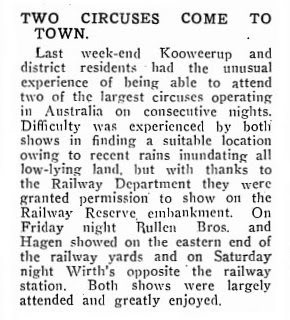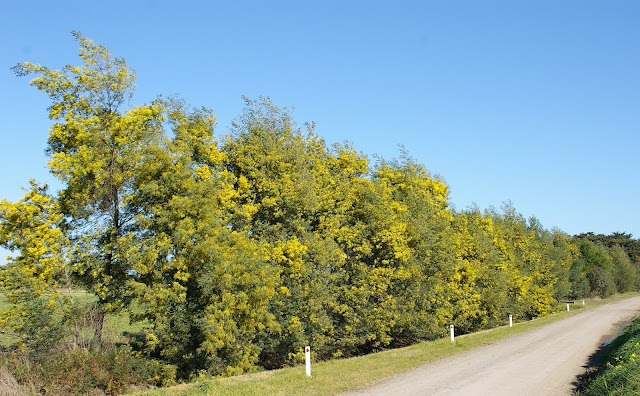It is wattle time on the Koo Wee Rup Swamp. I believe the local species is the Black Wattle (acacia mearnsii). It grows anywhere, it lines the Swamp roads and also the Main Drain from Bunyip to Koo Wee Rup and if you dig up any soil and leave it for a few weeks you will soon have black wattles growing. The trees are neat enough when they are young, but after a few years they get messy, branches break off and they begin to look a bit ugly.
They are a bit slower coming out this year, but I took these photos on July 31, 2011, and they show how lovely they are.
Looking west along Main Drain Road from the Eleven Mile bridge
Taken July 31, 2011
Same wattles along Main Drain Road, as in the image above, looking west
from the Eleven Mile bridge, showing the Main Drain
Taken July 31, 2011
Clump of wattles on Main Drain Road near the Eleven Mile bridge
Taken July 31, 2011
Looking east along Main Drain Road from the Eleven Mile bridge
Taken July 31, 2011
Looking south down Eleven Mile Road, from the Eleven Mile bridge
Taken July 31, 2011
The Main Drain - looking east from the Eleven Mile bridge
The blooms of the Black Wattle
Taken July 31, 2011
The flowers of the Black Wattle are a pale yellow, not nearly as pretty as the Cootamundra wattle (acacia baileyana) or Australia's floral emblem, the Golden Wattle (acacia pycnantha benth) but from late July to the first few weeks of August the Black Wattle is glorious - they line the roads and the drain banks and you can look across the paddocks and see glimpses of yellow everywhere. It really is a magnificent sight.
Swamp paperbark (melaleuca ericifolia)
Taken July 31, 2011
You can also see other remnant Swamp vegetation, including the Swamp Paperbark (
melaleuca ericifolia). The photograph, above, was taken in Dessent Road at Vervale, but you can see this everywhere on the Swamp.
Reeds
Taken July 31, 2011
Another common plant are the reeds (phragmites australia), they grow everywhere on the Swamp, where there is a bit of water. This photograph, above, was taken also taken in Dessent Road.
You can also see the reeds in the photograph, above. It is part of a series of post cards produced for Koo Wee Rup in the late 1940s or early 1950s. I think that's a blackwood wattle (acacia melanoxylon) behind the bridge.
William Wordsworth may well have been inspired by a host of golden daffodils, but to me there is nothing better that a host of golden wattles, brief though their time of glory may be.













